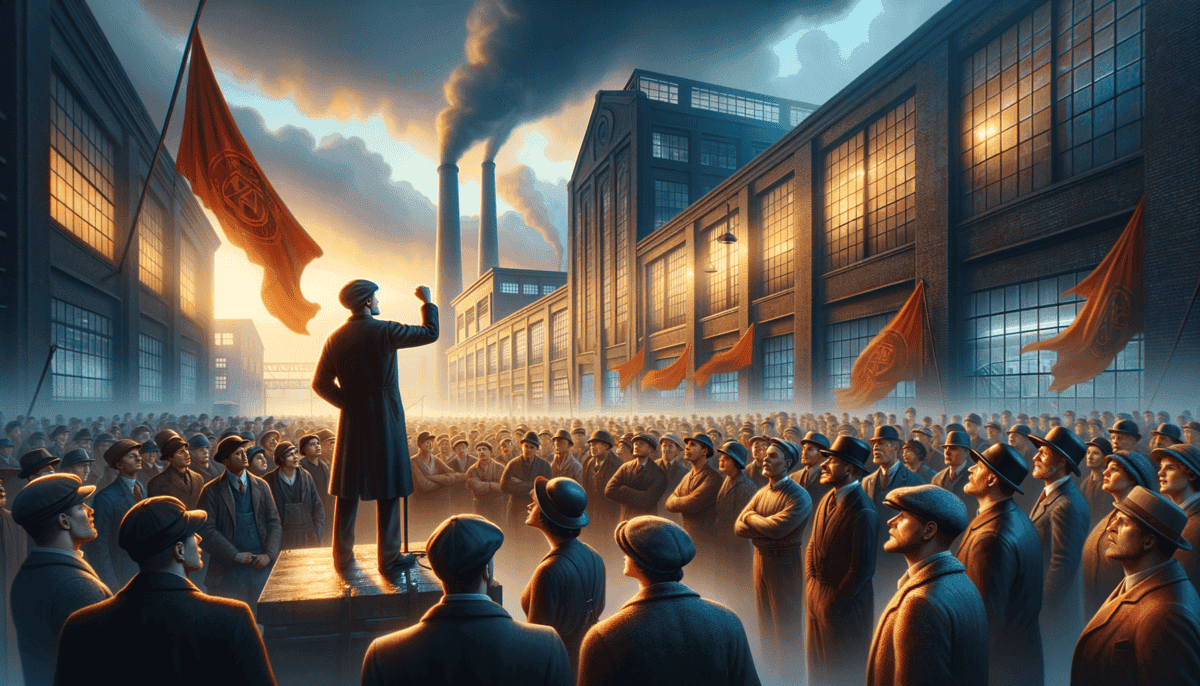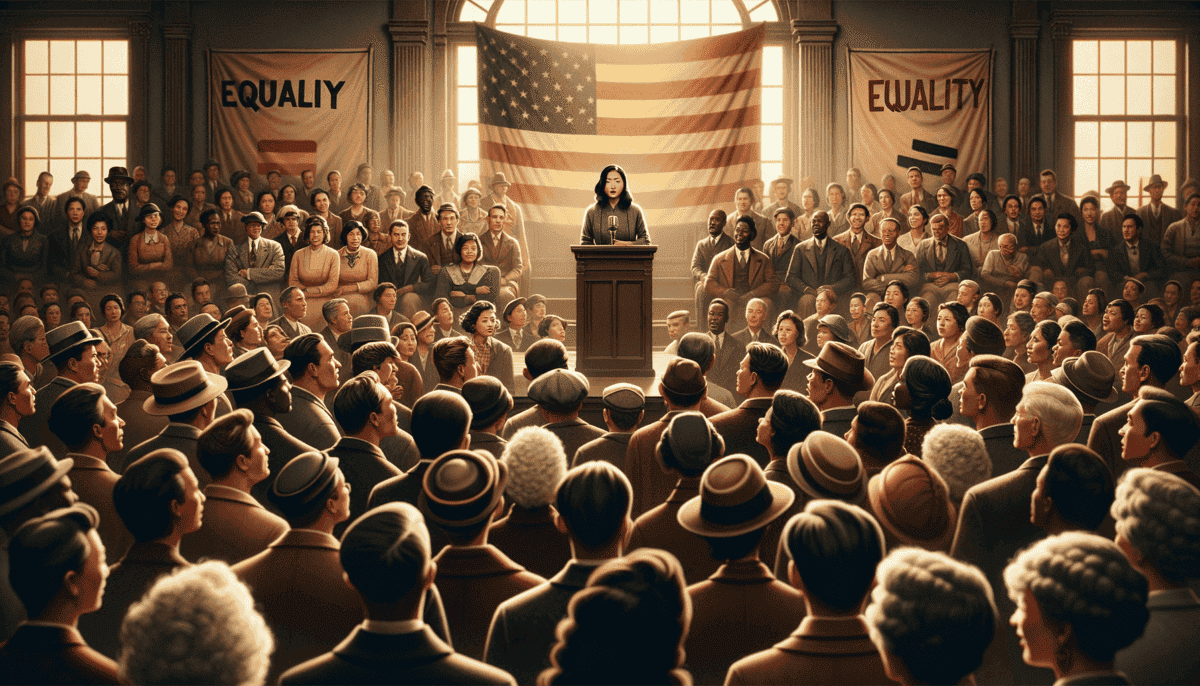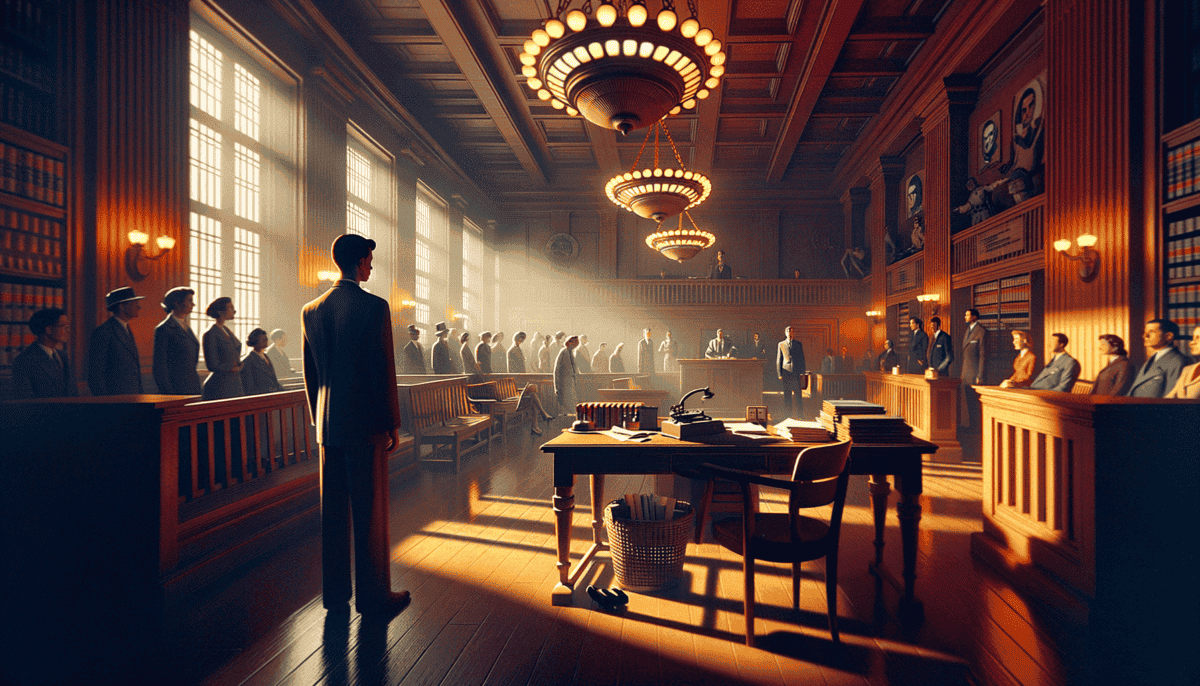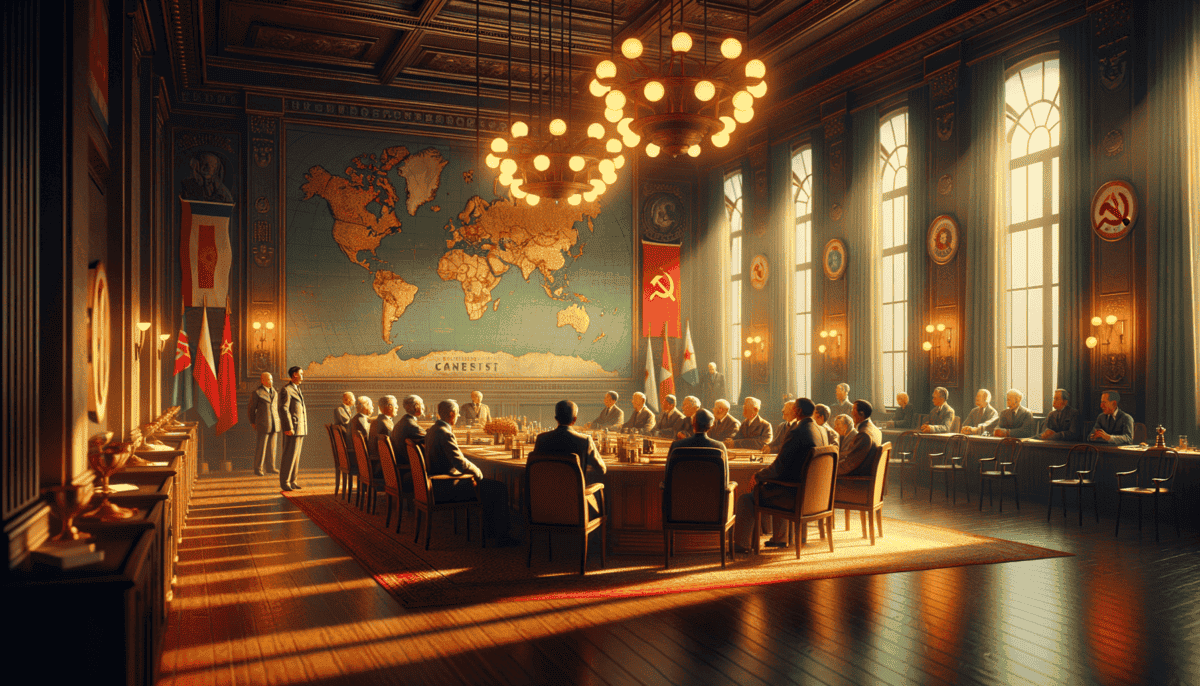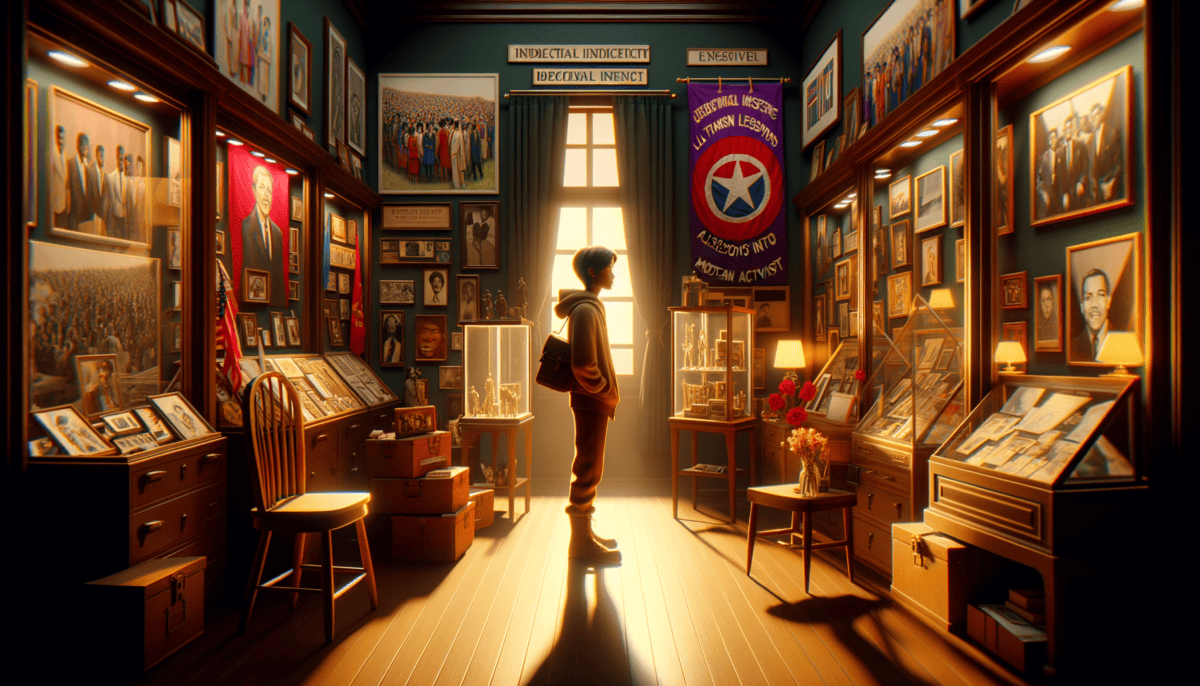Seeds of Revolution
Sarah Miller wiped sweat from her brow as she stood in the hot factory. The year was 1919, and the world was changing fast. She looked at her tired friends working next to her. They all wanted something better.
"We work too hard for too little," Sarah said to her friend Emma. The machines were so loud they had to shout. "There must be a better way!"
• 12-hour workdays
• Very little pay
• Dangerous conditions
• No breaks
Sarah wasn't alone in thinking things needed to change. All across America, workers were getting together to talk about new ideas. Some of these ideas came from a man named Karl Marx. He thought workers should own the factories, not just rich bosses.
"Have you heard about the new Communist Party?" Emma asked Sarah during their short lunch break. "They say they want to help people like us."
The Communist Party was brand new in America. It started when lots of small groups joined together. They wanted to make life better for poor people and workers.
“We believe all people should have enough food, good homes, and fair pay,” said Charles Ruthenberg, one of the party’s leaders. “Nobody should be too rich while others are too poor.”
Soon, Sarah and Emma started going to Communist Party meetings after work. They met in a small room above Joe's Bakery. The room was always full of people – factory workers, teachers, and writers. They all wanted to change America.
A Time of Big Dreams
"Welcome, brothers and sisters!" said Mike Thompson, standing on a wooden box. He was a tall man with kind eyes. "We're here because we dream of a better world."
The room was hot and cramped, but nobody minded. They were too excited about their plans. Mike told them about workers in other cities joining together. He talked about strikes that won better pay. People clapped and cheered.
Workers were joining together
People were standing up for their rights
Changes were starting to happen
But not everyone liked these new ideas. Rich factory owners were scared of losing power. Some people said communists were bad because they wanted to change things too much.
Sarah didn't care what those people said. She saw how the Communist Party helped her friends:
- They gave food to hungry families
- They helped workers learn to read
- They fought for safer factories
- They treated everyone equally, no matter their skin color
One night, after a long meeting, Sarah walked home with Emma under the stars. "Do you think we can really change things?" Emma asked.
Sarah smiled. "We have to try. Together, we're stronger than alone."
Growing Stronger
More people joined every day. The Communist Party grew bigger. They started a newspaper called "The Daily Worker." It told stories about workers fighting for better lives.
They had big dreams:
- Schools for everyone
- Doctors for sick people who couldn't pay
- Fair pay for all workers
- No more discrimination
But it wasn't easy. The police sometimes broke up their meetings. Some people lost their jobs for being communists. But they kept working for what they believed in.
Sarah worked hard to spread the word. She gave out newspapers and talked to other workers. She believed in a future where everyone had enough.
"We're making history," Mike told them at a meeting. "Years from now, people will remember how we fought for justice."
The room was quiet. Everyone felt the importance of what they were doing. They were part of something bigger than themselves.
Outside, the city was changing. Inside, hearts were full of hope. The seeds of revolution were growing, and nothing would ever be the same.
Dark Days and Brave Hearts
The factory whistle screamed through the cold October morning in 1929. Sarah now had gray in her hair, but her spirit was still strong. She watched as worried workers huddled in groups, whispering about the stock market crash.
“They’re closing the factory,” Emma said, her voice shaking. “What will we do?”
• Banks closed
• People lost jobs
• Families went hungry
• Many lost their homes
Standing Together
The Communist Party meeting room was packed tighter than ever. Mike Thompson’s hair was grayer too, but his voice was still strong. “Times are hard,” he said, “but we’ll help each other through this!”
The party started soup kitchens to feed hungry families. They helped people who lost their homes find places to stay. When landlords tried to throw poor families out, party members formed groups to stop them.
“We’re all in this together,” Sarah told a crying mother at the soup kitchen. “No one stands alone.”
Fighting Back
Workers were angry. Factory owners cut their pay even though people were already hungry. The Communist Party helped workers stand up for their rights.
“We won’t work for pennies!” shouted Tom, a steel worker. “We need enough to feed our families!”
• Big strikes
• Marches for jobs
• Food sharing programs
• Worker education
In Detroit, auto workers stopped working until they got better pay. In New York, garment workers marched in the streets. The Communist Party was there, helping organize and support the workers.
New Friends Join
Artists, writers, and teachers started joining the party too. They saw how the system wasn’t fair and wanted to help fix it.
“I used to think politics wasn’t for me,” said Mary, a young teacher. “But how can I ignore children coming to school hungry?”
Hard Choices
One cold night, Sarah found Emma crying outside the meeting hall. “My brother says I should quit the party,” Emma said. “He says it’s dangerous.”
Sarah hugged her friend. “We’re fighting for what’s right. That’s always worth the risk.”
The party faced many challenges:
• Police often broke up their meetings
• Some people called them bad names
• Rich people tried to stop their work
• Some members lost their jobs
But they kept going. They knew their work was important.
Hope Grows
By the mid-1930s, things started to change. President Roosevelt made new laws to help workers. Many of these ideas came from what the Communist Party had been fighting for.
“See?” Sarah told a group of young workers. “When we stand together, we can make things better!”
The Great Depression was still hard, but people weren’t giving up. The Communist Party helped them stay strong and keep fighting for a better life.
One evening, as Sarah walked home from another long day, she saw children playing in the street. They looked healthier now that their parents had better jobs. She smiled, knowing their work was making a difference.
“The darkness is always darkest before the dawn,” Mike often said. And in those hard times, the Communist Party helped keep hope alive for many Americans who had almost lost it.
Standing Up for All
Sarah walked into the meeting hall one spring evening in 1935. She noticed something different – more Black faces in the crowd than ever before. A young man named James stood at the front, speaking with fire in his voice.
“We can’t fight for workers’ rights without fighting for everyone’s rights!” James said. The room filled with cheers.
• Welcome Black members as equals
• Fight against unfair treatment
• Help Black workers organize
• Stand up to racist groups
A New Friend
Sarah met Ruby, a Black seamstress, at the next meeting. “I heard the Communist Party treats everyone the same,” Ruby said. “Is it true?”
“In this room, we’re all comrades,” Sarah replied with a warm smile. “We fight together or we don’t win at all.”
“When we join hands across color lines, we’re stronger,” James often said. “The bosses can’t divide us then.”
Fighting Back Together
The party worked hard to help Black communities:
• Fighting unfair housing rules
• Getting better jobs
• Starting free schools
• Protecting voting rights
When white workers wouldn’t let Black workers join their unions, the Communist Party stepped in. “Either we all get better pay, or none of us do,” Mike told the angry workers.
Brave Hearts
It wasn’t easy. Some people got very angry at the party for helping Black Americans.
“My own brother won’t talk to me anymore,” Sarah told Ruby one day. “He says I’m causing trouble.”
Ruby squeezed her hand. “You’re fixing trouble, not causing it.”
Standing Strong
One hot summer day, the party organized a big march. Black and white workers walked side by side, carrying signs asking for fair treatment.
“Look at that,” James said proudly. “They said this couldn’t happen. But here we are.”
The police tried to stop them. Mean people yelled at them. But they kept marching.
Making Progress
Ruby’s daughter got to go to a better school because of their work. James got a better job at the factory. Things were slowly changing.
“My grandma was a slave,” Ruby told Sarah one day. “She wouldn’t believe her eyes if she could see us now, working together like this.”
Hope for Tomorrow
At a meeting in 1940, Sarah looked around the room. Black and white faces smiled at each other. Children played together. It was like a dream coming true.
“We’re building something beautiful,” James said. “A world where everyone gets treated right.”
The fight wasn’t over. There was still lots of unfair treatment. But the Communist Party showed people something important – when you stand together, you can make big changes happen.
Sarah watched Ruby’s daughter playing with Mike’s son. “This is what we’re fighting for,” she thought. “A better world for all our children.”
The room was warm with hope that night. They knew the road ahead would be hard, but they weren’t afraid. They had each other, and that made them strong.
Dark Times Coming
The meeting hall felt different that cold evening in 1947. Sarah noticed fewer faces in the crowd. Many chairs sat empty. Fear had started to creep in.
“They’re watching us,” Mike whispered. “The government men. They say we’re bad for America.”
• The government said communists were dangerous
• Many lost their jobs
• Some went to jail
• Friends turned against friends
Scary Changes
Sarah’s neighbor wouldn’t talk to her anymore. “Communist!” she had yelled across the fence. The word sounded like a bad thing now.
“We just want to help people,” Sarah told Ruby. “Why are they so angry at us?”
Ruby squeezed her hand. “They’re scared of change. Scared of people working together.”
“Stay strong,” James would say. “We’re not doing anything wrong by wanting a fair world.”
Hard Choices
Mike lost his job at the factory. “Boss said he can’t keep communists around,” he said, his voice shaking.
Some people left the party. They were too scared to stay. Sarah understood but felt sad watching them go.
The government made a list of communist party members. Having your name on it could ruin your life.
Standing Together
One day, men in suits came to the meeting hall. They took pictures and wrote down names.
“Don’t let them scare you,” Ruby said. But Sarah saw fear in her friend’s eyes too.
Hidden Meetings
They started meeting in secret. Sometimes in basements, sometimes in quiet parks.
“Like the underground railroad,” Ruby joked, but her smile was sad.
Sarah missed the big, noisy meetings. She missed seeing all their friends together.
Not Giving Up
A man named McCarthy appeared on TV. He said communists were everywhere, trying to hurt America.
“But we love America,” Sarah cried. “We just want to make it better!”
James nodded. “They don’t understand. Or maybe they don’t want to understand.”
Staying Strong
The group got smaller, but those who stayed grew closer. They helped each other find new jobs. They shared food when someone was hungry.
“We’re family now,” Mike said. “They can’t take that away.”
Sarah watched their children playing quietly in the corner. They had to be careful now, even about that.
The room felt colder these days. But when Sarah looked at her friends’ faces, she still saw hope. They would keep fighting for what they believed in, no matter how hard it got.
Outside, the streets grew darker with fear. But inside their hearts, the dream of a fair world still burned bright.
The Storm Grows Stronger
Sarah sat by her window, watching rain fall on empty streets. The newspaper on her lap showed pictures of Soviet tanks. The year was 1956, and everything was changing again.
Bad News from Far Away
“Have you seen what’s happening in Hungary?” Mike’s voice trembled over the phone. “The Soviets… they’re hurting their own people.”
Breaking Hearts
“I can’t stay,” Ruby told Sarah one rainy evening. “Not after what I’ve seen.”
Sarah watched her oldest friend pack up her party badge. More people were leaving now, their dreams broken.
“We believed in something beautiful,” Ruby whispered. “But maybe we were wrong about how to get there.”
Fighting Inside
The small meeting room felt tense. People argued about what to do next.
“We should stand with the Soviet Union!” shouted one group.
“No, we need our own American way!” answered others.
The party was breaking into smaller groups. Old friends stopped talking to each other.
Trying to Hold On
James still believed. “We can find a new path,” he told the few who stayed. “One that works for America.”
But Sarah saw the tired lines around his eyes. Everything they built was falling apart.
Looking for Answers
Sarah’s daughter asked questions now. “Mom, why do people say communists are bad?”
Sarah struggled to explain. The simple dreams of making a fair world seemed harder to talk about.
Change in the Air
New groups were forming. Young people talked about peace and civil rights. Some old party members joined them, bringing their experience.
“Maybe this is how the dream lives on,” Mike said. “In new ways, with new faces.”
Finding Hope
Sarah kept a box of old photos. Happy faces at picnics and rallies. Children playing while parents planned a better world.
“We were family once,” she told her daughter. “And we tried to make things better.”
Outside her window, new movements were growing. Different names, different songs, but the same dream of fairness lived on.
The communist party was getting smaller, but its old members still carried hope in their hearts. They had learned hard lessons about trust and change. Now they watched as new generations picked up the fight for a better world, in their own way.
A Dream Lives On
The old meeting hall stood empty now. Sarah touched the worn wooden walls one last time. It was 1970, and times had changed so much.
Saying Goodbye
“We’re selling the building,” James announced quietly. Only five people had come to the final meeting. “But not our memories.”
New Voices Rising
Sarah’s daughter Rachel marched in the streets now. Not for communism, but for peace and equal rights.
“You taught me to fight for what’s right, Mom,” Rachel smiled. “I’m just doing it my way.”
Sarah watched young people with long hair and bright signs. They sang different songs but wanted many of the same things – fairness, peace, and justice.
Looking Back, Moving Forward
Mike visited Sarah’s porch on warm evenings. They remembered old friends and talked about what had changed.
“We made mistakes,” Mike said softly. “But we also did good things.”
• They helped workers get better jobs
• They fought against racism
• They stood up for people who needed help
Seeds Growing
Sarah saw their old work growing in new ways:
Civil rights leaders used lessons from communist organizers. Union members still sang the songs they wrote. Young activists learned from their mistakes and successes.
A New Chapter
One day, Rachel brought home a history book. It had a chapter about the Communist Party in America.
“Is this really how it was, Mom?” she asked.
Sarah smiled. “It’s more than what’s in books. It’s about people who dared to dream big.”
The Story Continues
Years later, Sarah sat with her grandchildren. They asked about the old photos in her box.
“Tell us about when you tried to change the world,” they said.
Sarah looked at their bright eyes and saw the same hope she once had. The Communist Party might be gone, but the fight for a better world lived on in new ways.
As the sun set, Sarah thought about all the brave people she had known. Their party hadn’t changed everything like they hoped. But they had planted seeds of courage and hope that kept growing in unexpected places.
The dream of making a fairer world didn’t belong to just one group or time. It belonged to everyone who believed things could be better, and wasn’t afraid to work for change.


